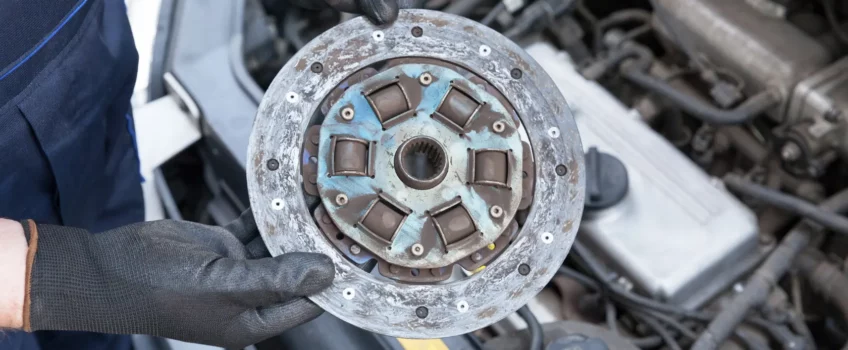
Hydraulic Clutch vs Mechanical Clutch: Know The Difference
Hydraulic clutch systems and their mechanical counterparts play pivotal roles in your vehicle’s transmission, enabling you to shift gears with precision and ease. Grasping the mechanics behind these essential components is not only fascinating but crucial for a seamless drive. As we navigate through the complexities of both systems, we explore the nuances that distinguish them, share maintenance tips to ensure their longevity, and highlight the importance of entrusting your vehicle to the skilled hands at Elite Garages service centres. Understanding the heart of your vehicle starts here, with the touch of the clutch.
What Is a Clutch and How Does It Work?
At the heart of your driving experience lies the clutch, a crucial component that bridges the gap between your engine’s relentless power and the serene spin of your wheels. Simply put, a clutch is what allows you to smoothly engage and disengage the engine from the transmission system without bringing the vehicle to a halt. It’s the secret sauce that lets you shift gears with a flick of the wrist and a tap of the foot, ensuring a seamless transfer of power.
Mechanical Clutch: The Traditional Touch
- Operational Basics: Mechanical clutches operate through a system of cables or linkages that physically connect the clutch pedal to the clutch mechanism.
- Driver Feedback: They offer a tangible, physical connection to the gears of your vehicle, often requiring a bit more muscle to operate.
Hydraulic Clutch: The Fluid Performer
- Operational Fluidity: Hydraulic clutches, on the other hand, use the principles of hydraulics to transmit pressure from the pedal to the clutch mechanism.
- Ease of Use: They typically provide a lighter pedal feel and can self-adjust to compensate for wear over time.
The Key Differences Between A Mechanical and Hydraulic Clutch
Understanding the nuances of your clutch can profoundly impact your driving experience and vehicle maintenance. Here are the key differences between mechanical and hydraulic clutches to keep in mind:
Mechanical Clutch Traits:
The mechanical clutch operates on a system of levers, springs, and cables. When you press the clutch pedal, these components work together to disengage the clutch plate from the engine, allowing you to change gears.
- More direct pedal feel
- Requires manual adjustment as components wear
- Often found in older or more basic vehicle models
Hydraulic Clutch Qualities:
The hydraulic clutch relies on pressurised fluid to disengage the clutch plate from the engine. When you press the pedal, it activates a piston that transmits pressure through the fluid to disengage the clutch.
- Smooth and light pedal feel
- Self-adjusting mechanism
- Common in modern vehicles, providing a more forgiving drive
- Hydraulic clutches typically have a longer lifespan
Maintaining Your Mechanical or Hydraulic Clutch
To ensure your vehicle’s clutch system remains in top shape, here are some tips from our skilled technicians at Elite Garages:
- Regularly check and replace clutch fluid, as recommended in your vehicle’s manual.
- Avoid riding the clutch, i.e. keeping your foot on the clutch pedal while driving, as this can cause unnecessary wear and tear.
- Listen for any unusual noises or vibrations when engaging or disengaging the clutch, as they could be signs of a potential issue.
- If you notice any issues with your clutch, such as difficulty shifting gears or a spongy pedal feel, bring your vehicle to Elite Garages for a thorough inspection and necessary repairs.
Related: When Should I Consider A Clutch Repair?
What a Clutch Car Service Entails
At our network of service centres across the south and south-east of England, a clutch car service is far more than a routine check-up. It is a comprehensive examination of one of your vehicle’s most intricate and vital parts. Our skilled technicians meticulously assess:
- Clutch disc condition
- Pressure plate functionality
- Release bearing smoothness
- Cable wear and tear (for mechanical clutches)
- Hydraulic fluid levels and potential leaks (where applicable for a hydraulic clutch)
Recommended: What Type of Car Service Do I Need?
Trust the Experts at Elite Garages
Whether you’re a car enthusiast or just looking to understand your vehicle better, knowing the difference between a mechanical and hydraulic clutch is essential. Their distinct operational methods, maintenance requirements, and benefits all contribute to the overall driving experience.
As technology continues to advance and cars become more sophisticated, it’s important to stay informed about these critical components. And with Elite Garages’ expert service and care, you can rest assured that your vehicle’s mechanical or hydraulic clutch will be in good hands.
Our trained technicians have extensive knowledge and experience in servicing and repairing all types of clutches. With our state-of-the-art equipment and attention to detail, you can trust us to keep your vehicle running smoothly. Book an appointment at one of our service centres today for a hassle-free driving experience tomorrow.
About Us
Opening Times
Saturday : 8:30–4:00
Sunday : closed
More Information
Contact UsCustomer Information Pack
Check MOT Due Date
Free MOT reminder
Careers


